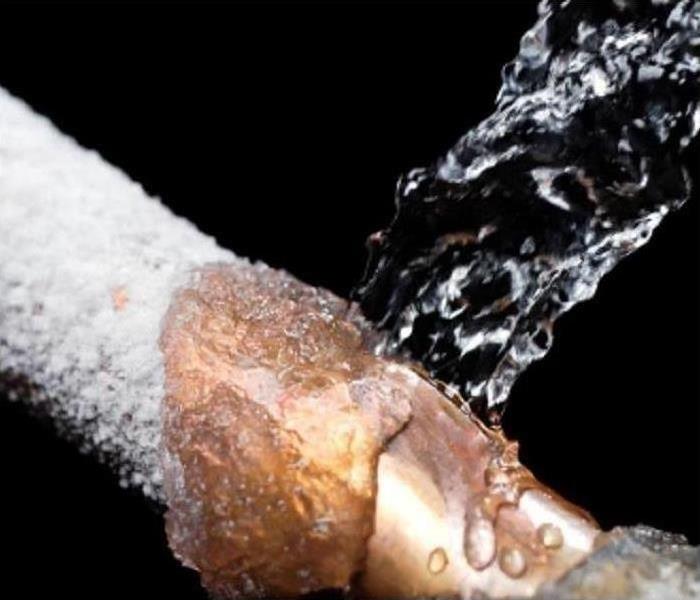Prevent Frozen Pipes from Causing Water Damage
9/22/2017 (Permalink)
Frozen pipes are a leading cause of water damage in the colder months of the year. Why?
Water has the unfortunate property in that as it freezes, it expands. This can affect all types of water lines, whether metal, plastic, or PVC. Simply, all pipes are subject to bursting given the right amount of pressure. As the water freezes, it can expand the pipe, eventually, cause a hairline crack or a complete break. At that point the portion unfrozen will then provide a continual stream of water until shut off, causing water damage throughout the property.
How can I prevent my pipes from freezing or bursting?
If possible, make sure that all pipes and supply lines on exterior walls are insulated. Exterior walls will be much colder than interior walls given their location. Additionally, all water lines in basements and crawlspaces need to be insulted as they will be subjected to very cold temperatures. Simple foam insulation wrap can help prevent your pipes from freezing.
Make sure all outdoor hoses are removed from exterior hose bibs.
Always keep your heating unit on and operational, even when away on vacation. If leaving for an extended period of time, set your thermostat to no colder than 55 degrees to ensure that your home has enough heat to properly keep interior pipes from freezing.
Keep garage doors closed if you have water supply lines located in that area. In extreme cases of sever cold for extended periods of time, ensure that exposed pipes are insulated. Space heaters (placed away from anything flammable) can provide heat and warmth to combat cold environments in garage areas.
If you notice very low water pressure from water supply areas, a frozen pipe could be the cause. Immediate action should be taken to identify the problem.
What should I do if my pipes are already frozen?
Turn on all the faucets with warm water, not hot, to a slow drip. This will help in supplying warmer water to the area without causing an abrupt temperature change. It will also help you in determining the location of the freeze.
Apply exterior heat to the frozen section of pipe. This can be done with a hair dryer, electric heating pad, space heater, towels soaked in warm water wrapped around the pipe. NEVER use open flame devices as this can be a major fire hazard.
Keep continual heat on the area until water flow is restored to normal.
Once restored, try to determine why the area froze. It may be as simple as adding insulation, sleeve wraps, UL listed heat tape, or other forms of insulation.
If you cannot locate, find, or properly thaw your pipes, call a professional plumber to assist.
What if my pipes burst and caused damage?
If your pipes have busted, cracked, or began leaking, immediate action should be taken to ensure that water damage can be minimized to your property. Soak up as much water as possible with towels or extract with a shop vac. It's often necessary to have professionals like SERVPRO come in and completely mitigate the water. Home drying efforts can help reduce damages, but will not get rid of all moisture and humidity. It's important to ensure that your property is completely dry and dehumidified to prevent secondary damage from ruining your home, flooring, furnishings, or building materials. Call SERVPRO today if you've had water damage from a pipe leak, and we'll work with you and/or your insurance company to make sure that your home is restored correctly!
Get more water damage tips here.






 24/7 Emergency Service
24/7 Emergency Service
